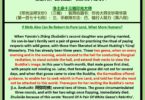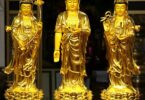◎ 民国 • 贫妇
[The] People’s Republic [Of China: [The] Poor Woman
浙江慈溪一贫妇,未知其姓氏。家甚贫,子不孝,常骂詈之。
[In] Zhèjiāng’s Cíxī [county was] a poor woman, [with] her family name unknown. [Her] family [was] extremely poor, [and her] son [was] not filial, often scolding her.
[Note 1: If despite being a good parent in this life, yet still having wilful children, this is truly a result of much heavy negative karma from one’s past lives still ripening. Likewise, if despite being a good child in this life, yet still having wilful parents, this is truly a result of much heavy negative karma from one’s past lives still ripening.]
一日被子骂,心苦难受,诉之邻近寺僧。
One day, by [her] son scolded, [with her] mind’s suffering difficult [to] bear, [she] complained [about] him [to a] neighbouring monastery’s monastic.
[Note 2: In both cases of Note 1, there should not be any resentment, that will only feed fuel to the fire of hatred. On the behalf of all, there should be more personal practice of sincere repentance (忏悔), mindfulness of Buddha (念佛) and dedication of merits (回向) to all, to reduce the animosity in between, and transform all for the better. This applies to all kinds of troubled relationships. As long as one keeps doing one’s best to improve relationships, there is no need to feel troubled by them.]
僧曰:「汝已知苦,何不卖去?」
[The] monastic said, ‘[As] you already know suffering, why not go sell [it]?’
妇曰:「如何卖得了?」
[The] woman said, ‘How can [it] be sold?’
僧曰:「汝专念阿弥陀佛,求生西方,临终佛来接去,则永离众苦,但受诸乐,便把苦卖了。」
[The] monastic said, ‘You [should] focus [on sincere] recitation [of] Āmítuófó’s [name, to] seek birth [in his] Western [Pure Land. When] approaching [the] end [of life, the] Buddha [will] come [to] receive [you to] go [there]. Then forever departing [from] all suffering, only receiving all [kinds of] bliss, [this is] then [to] have suffering sold already.’
[Note 3: Even with nothing material to offer due to poverty, it is possible to start giving up pointless suffering now, by aspiring to reach Āmítuófó’s Pure Land, to receive great bliss instead. Even for the poor, there can still be ‘offering’ of sincere mindfulness of his name, to express and accumulate the Three Provisions (三资粮) of profound Faith (深信), sincere Aspiration (切愿) and true Practice (实行) to reach his Pure Land.]
妇曰:「我母子共房,床灶俱在一室,床下尚作猪圈,如此邋遢,何能念佛。」
[The] woman said, ‘[As] we mother [and] son share [a] room, [with a] bed [and] stove together in one room, [with the] bed below, still serving [as a] pigsty, in this way, [with all so] sloppy, how [am I] able [to be] recite [the] Buddha[‘s name]?’
[Note 4: Ideally, to prevent harming of sentient beings and creating of heavy negative karma, there should not be rearing of any livestock, especially if they are fed with other animals’ flesh, and will be slaughtered later.]
僧曰:「无妨,汝在家时,只管常念,暇时可来寺拜佛。」
[The] monastic said, ‘[There is] no harm [in reciting]. When you [are] at home, only pay attention [to having] constant recitation. [In your] spare time, [you] can come [to the] monastery [to] prostrate [to the] Buddha.’
[Note 5: Wherever one is, what most crucial to have is sincere recitation of the Buddha’s name, be it verbally or silently. Even if difficult to have constant recitation, it should be as often as possible.]
[Note 6: Ideally, if there is some appropriate space available, there can be setting up of a picture (or statue) of the Buddha to create a simple shrine, for prostrating before it. This can serve as a centre for making basic offerings, and as a reminder to practise mindfulness of Buddha.]
妇即依教奉行,专求脱苦,念佛无间。
[The] woman then relied [on these] teachings [to] practise, focusing [on] seeking liberation [from] suffering, [with] recitation [of the] Buddha’s [name] without interruption.
[Note 7: The key elements of her sincere practice are (1) constant focus on recitation of Āmítuófó’s name, (2) to seek birth in his Pure Land, (3) as motivated by liberation from her great suffering.]
[Note 8: This is an excellent example of transforming worldly suffering to be spiritual motivation to practise diligently. The greater the suffering we have, instead of pointlessly lamenting on it and fretting over it, the more should we use this suffering as a resource, for transforming it into the Three Provisions.]
二三年后,将终前数月,即预示其子云:「至某月日,我当生西,汝勿外出,当为我料理,尽母子之道。」其子不信,不久又作是言。
Two [to] three years later, several months before [her life was] going [to] end, [she] then in advance informed her son, saying, ‘Reaching [this] certain month’s day, I will [be] born [in the] Western [Pure Land]. You [should] not go out [then, as you] should for me [make funeral] arrangements, [to] complete [the filial] path [of] mother [and] son.’ [As] her son [did] not believe [her], not long [later, she] again made this statement.
[Note 9: With her practice having become proficient, this is confident double confirmation of her knowledge in advance, of the time of her arrival (预知时至) in Pure Land. With what mentioned later happening as announced, this is among the strongest of proofs, of the great efficacy of Pure Land practice, that leads to knowledge of when one will be departing from this life, to take the swiftest path to Buddhahood via Pure Land. As an ordinary being (凡夫), being unenlightened, it is only with firm connection to Āmítuófó, that there can be such precise advanced knowledge.]
及期前数日,其子忽闻异香扑鼻,不知何来,到处遍觅,不见焚香所在,乃忆母言,莫非是实。
Several days before reaching [the] date, her son suddenly smelled extraordinary fragrance ‘assailing’ [his] nose. Not knowing where [it came] from, [he went] everywhere [to] search [for it]. Not seeing [any] place burning incense, [he] then recollected [his] mother’s words, [and thought they] must be true.
[Note 10: This is the auspicious sign (瑞相) of ‘Extraordinary Fragrance Filling The Room’ (异香满堂). (i) It is auspicious because it arises from connection to Āmítuófó. (ii) It is extraordinary because it is transcendental, thus different from the worldly. (iii) It is a fragrance because it expresses the meritorious virtues of Āmítuófó in terms of smell. (iv) It fills the room because his great blessings permeate everywhere.]
[Note 11: The manifestation of this auspicious sign in advance, before her departure for Pure Land, was perhaps a skilful means by Āmítuófó, to get her son to pay enough attention to what she said. This urged him to be filial in time, and to have more Faith in the Pure Land teachings, (along with us).]
至期,乃在家守候,见母自沐清洁,穿净衣,果端坐念佛而逝,时在民国十年前后。
[When] reaching [the] date, then at home keeping watch [and] waiting, [he] saw [his] mother bathe [to] clean herself, [and] wearing clean clothes. Sure enough, [she] sat upright, recited [the] Buddha[‘s name, and] then departed. [The] date [was] in [the] People’s Republic [Of China’s] tenth year, before [or] after.
[Note 12: Although not a must, since there is advanced knowledge of when she is departing, cleaning herself and putting on clean clothes is to make it easier for her son to handle her body after departure, as there will be no need to do the above again. It also expresses reverence for the moment Āmítuófó comes to receive her.]
如此贫妇,一无所知,念佛数年,尚能预知时至,异香先发,安然西去。可见净土法门,真无人不堪修者。
In this way, this poor woman, without knowing anything [much] at all, [with] recitation [of the] Buddha[‘s name for] several years, [was] still able [to] know in advance [the] time [of her] arrival [in Pure Land, to have] extraordinary fragrance first emitted, [then] peacefully [to the] West departing. [From this, it] can [be] seen [that the] Pure Land Dharma Door, truly [is] without those people [who] cannot cultivate [it].
[Note 13: Although not knowing much, she did know enough, with what learnt above, to practise sincerely and diligently accordingly. However, this is indeed an excellent example, of how there need not always be much advanced knowledge, to have successful practice.]
[Note 14: For those less easily sincere and diligent in practice however, there should be more learning, so as to transform doubts to be Faith, lack of motivation to be Aspiration, and laziness to be Practice. If those not sincere and diligent do not further learn, while misunderstanding or belittling the Pure Land teachings with their limited ‘intellect’, they are surely not wiser than the poor woman, who is now spiritually rich.]
(在佛顶时,亲闻定法师说,惜当时未详问其姓氏年月。德森记。)
(When at Buddha’s Peak, personally hearing Dharma Master Dìngfǎ saying [this, it was a] pity then, [that I did not] clearly ask [for] her family name, [the] year [and] month. [By] Désēn recorded.)
《净土圣贤录》:
(Record [Of] Pure Land’s Noble Sages):
三编:往生女人第四
Third Compilation: Fourth [Section On] Reborn Women
德森撰
Compiled [By] Dé Sēn
Namo Amituofo : Translation and notes by Shen Shi’an
相关偈子
Related Verses:
改业偈
Verses On Changing Karma
https://purelanders.com/2020/12/01/verses-on-changing-karma





